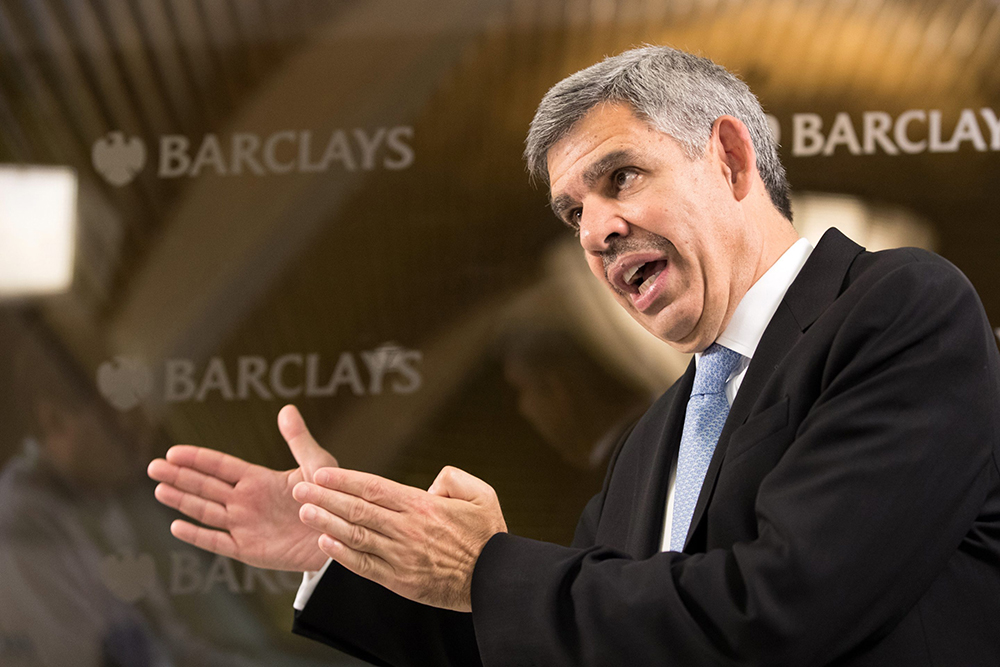
過(guò)去兩年,穆罕默德·埃里安一直在批評(píng)美聯(lián)儲(chǔ)(Federal Reserve)。他認(rèn)為美聯(lián)儲(chǔ)的一系列失誤,將美國(guó)經(jīng)濟(jì)陷入絕境。
這位經(jīng)濟(jì)學(xué)家表示,通過(guò)“暫時(shí)性”抑制通脹和在美國(guó)經(jīng)濟(jì)從新冠疫情中復(fù)蘇之后繼續(xù)維持近零利率,美聯(lián)儲(chǔ)讓物價(jià)上漲難以抑制。
埃里安于9月21日在美國(guó)有線(xiàn)電視新聞網(wǎng)(CNN)的一檔專(zhuān)欄節(jié)目中表示,這導(dǎo)致美聯(lián)儲(chǔ)主席杰羅姆·鮑威爾處在一個(gè)“左右為難”的境地。埃里安現(xiàn)任劍橋大學(xué)(Cambridge University)皇后學(xué)院(Queens’ College)的院長(zhǎng)和安聯(lián)(Allianz)的首席經(jīng)濟(jì)顧問(wèn)。
美聯(lián)儲(chǔ)可能繼續(xù)加息應(yīng)對(duì)通脹,即使經(jīng)濟(jì)增速放緩,這會(huì)增加經(jīng)濟(jì)陷入全面衰退的風(fēng)險(xiǎn)。為了避免衰退,美聯(lián)儲(chǔ)也能夠選擇減少應(yīng)對(duì)通脹的努力,這會(huì)導(dǎo)致消費(fèi)者在可以預(yù)見(jiàn)的未來(lái)更有可能長(zhǎng)期面對(duì)高物價(jià)。
埃里安指出,無(wú)論怎么做,都會(huì)給公眾造成“嚴(yán)重的附帶損害和意外的不良后果。”
除了埃里安,華爾街還有其他資深投資者認(rèn)為,美聯(lián)儲(chǔ)在去年犯錯(cuò)之后一直在努力追趕。
Bankrate的首席財(cái)務(wù)分析師格雷戈·麥克布萊德對(duì)《財(cái)富》雜志表示:“美聯(lián)儲(chǔ)沒(méi)有盡早發(fā)現(xiàn)通貨膨脹,加息和減少債券收購(gòu)的動(dòng)作都不夠及時(shí)。他們之后一直在努力追趕,但至今未能趕上。”
埃里安稱(chēng),這意味著美國(guó)經(jīng)濟(jì)避免經(jīng)濟(jì)衰退的概率正在快速下降。
他告訴《財(cái)富》雜志:“不幸的是,‘軟著陸’的概率已經(jīng)變得非常低。所謂軟著陸即降低通脹但不會(huì)嚴(yán)重影響經(jīng)濟(jì)增長(zhǎng)。”
Morning Consult的首席經(jīng)濟(jì)學(xué)家約翰·利爾指出,美聯(lián)儲(chǔ)官員本周“大幅提高”對(duì)未來(lái)兩年的通脹率和失業(yè)率的預(yù)測(cè),同時(shí)降低了對(duì)經(jīng)濟(jì)增長(zhǎng)的預(yù)測(cè)。這為埃里安的觀點(diǎn)提供了佐證。
利爾向《財(cái)富》雜志表示:“就連美聯(lián)儲(chǔ)對(duì)它自己實(shí)現(xiàn)軟著陸的能力也變得越來(lái)越?jīng)]有信心。”
全球經(jīng)濟(jì)增長(zhǎng)減速
埃里安之所以認(rèn)為美國(guó)經(jīng)濟(jì)不可能實(shí)現(xiàn)軟著陸,理由不止是因?yàn)槊缆?lián)儲(chǔ)需要激進(jìn)加息以應(yīng)對(duì)通脹,還因?yàn)槿蚪?jīng)濟(jì)都在放慢增長(zhǎng)速度。
他指出,全球三個(gè)最大經(jīng)濟(jì)體都面臨困境,而斯里蘭卡和阿根廷等發(fā)展中國(guó)家的通脹率已經(jīng)達(dá)到了難以維持的地步。
埃里安告訴《財(cái)富》雜志:“在三個(gè)最具有系統(tǒng)重要性的經(jīng)濟(jì)體中,歐洲幾乎一定會(huì)陷入衰退,中國(guó)的經(jīng)濟(jì)增長(zhǎng)遠(yuǎn)低于歷史平均水平,而美國(guó)因?yàn)樾袆?dòng)遲緩的美聯(lián)儲(chǔ)正在滑入經(jīng)濟(jì)衰退的漩渦。這對(duì)于部分陷入困境的發(fā)展中國(guó)家而言可能會(huì)火上澆油。”
歐洲的能源危機(jī)在最近幾周日益惡化,導(dǎo)致德意志銀行(Deutsche Bank)認(rèn)為歐盟正在滑入嚴(yán)重衰退,這證明了埃里安的觀點(diǎn)。
與此同時(shí),投資銀行不斷下調(diào)對(duì)中國(guó)經(jīng)濟(jì)增長(zhǎng)的預(yù)期,因?yàn)橹袊?guó)一方面面臨房地產(chǎn)危機(jī),同時(shí)因?yàn)橐咔榉揽兀瑢?dǎo)致工廠繼續(xù)停工,并阻礙消費(fèi)者消費(fèi)。
除此之外,中國(guó)在夏季遭遇了創(chuàng)紀(jì)錄的熱浪,目前依舊要解決干旱問(wèn)題,干旱對(duì)供應(yīng)鏈產(chǎn)生了破壞。
但不止中國(guó)和歐洲的經(jīng)濟(jì)正在下滑。世界銀行(World Bank)、美國(guó)銀行(Bank of America)等重要機(jī)構(gòu)的經(jīng)濟(jì)學(xué)家們?cè)谧罱鼛讉€(gè)月都紛紛大幅下調(diào)了對(duì)全球經(jīng)濟(jì)增長(zhǎng)的預(yù)測(cè)。
埃里安認(rèn)為,各主要經(jīng)濟(jì)體經(jīng)濟(jì)下滑加上央行加息,必定會(huì)引發(fā)災(zāi)難。
這位經(jīng)濟(jì)學(xué)家的評(píng)論,與世界銀行的副行長(zhǎng)阿伊汗·高斯在本周早些時(shí)候發(fā)表的觀點(diǎn)遙相呼應(yīng)。世界銀行在之前發(fā)布了關(guān)于全球經(jīng)濟(jì)衰退概率提高的最新研究。
高斯表示,由于全球央行同步加息,可能產(chǎn)生“相互影響的復(fù)合”效應(yīng)。這意味著“全球經(jīng)濟(jì)增長(zhǎng)減速”無(wú)法避免,而“全球經(jīng)濟(jì)衰退”的可能性與日俱增。(財(cái)富中文網(wǎng))
譯者:劉進(jìn)龍
審校:汪皓
過(guò)去兩年,穆罕默德·埃里安一直在批評(píng)美聯(lián)儲(chǔ)(Federal Reserve)。他認(rèn)為美聯(lián)儲(chǔ)的一系列失誤,將美國(guó)經(jīng)濟(jì)陷入絕境。
這位經(jīng)濟(jì)學(xué)家表示,通過(guò)“暫時(shí)性”抑制通脹和在美國(guó)經(jīng)濟(jì)從新冠疫情中復(fù)蘇之后繼續(xù)維持近零利率,美聯(lián)儲(chǔ)讓物價(jià)上漲難以抑制。
埃里安于9月21日在美國(guó)有線(xiàn)電視新聞網(wǎng)(CNN)的一檔專(zhuān)欄節(jié)目中表示,這導(dǎo)致美聯(lián)儲(chǔ)主席杰羅姆·鮑威爾處在一個(gè)“左右為難”的境地。埃里安現(xiàn)任劍橋大學(xué)(Cambridge University)皇后學(xué)院(Queens’ College)的院長(zhǎng)和安聯(lián)(Allianz)的首席經(jīng)濟(jì)顧問(wèn)。
美聯(lián)儲(chǔ)可能繼續(xù)加息應(yīng)對(duì)通脹,即使經(jīng)濟(jì)增速放緩,這會(huì)增加經(jīng)濟(jì)陷入全面衰退的風(fēng)險(xiǎn)。為了避免衰退,美聯(lián)儲(chǔ)也能夠選擇減少應(yīng)對(duì)通脹的努力,這會(huì)導(dǎo)致消費(fèi)者在可以預(yù)見(jiàn)的未來(lái)更有可能長(zhǎng)期面對(duì)高物價(jià)。
埃里安指出,無(wú)論怎么做,都會(huì)給公眾造成“嚴(yán)重的附帶損害和意外的不良后果。”
除了埃里安,華爾街還有其他資深投資者認(rèn)為,美聯(lián)儲(chǔ)在去年犯錯(cuò)之后一直在努力追趕。
Bankrate的首席財(cái)務(wù)分析師格雷戈·麥克布萊德對(duì)《財(cái)富》雜志表示:“美聯(lián)儲(chǔ)沒(méi)有盡早發(fā)現(xiàn)通貨膨脹,加息和減少債券收購(gòu)的動(dòng)作都不夠及時(shí)。他們之后一直在努力追趕,但至今未能趕上。”
埃里安稱(chēng),這意味著美國(guó)經(jīng)濟(jì)避免經(jīng)濟(jì)衰退的概率正在快速下降。
他告訴《財(cái)富》雜志:“不幸的是,‘軟著陸’的概率已經(jīng)變得非常低。所謂軟著陸即降低通脹但不會(huì)嚴(yán)重影響經(jīng)濟(jì)增長(zhǎng)。”
Morning Consult的首席經(jīng)濟(jì)學(xué)家約翰·利爾指出,美聯(lián)儲(chǔ)官員本周“大幅提高”對(duì)未來(lái)兩年的通脹率和失業(yè)率的預(yù)測(cè),同時(shí)降低了對(duì)經(jīng)濟(jì)增長(zhǎng)的預(yù)測(cè)。這為埃里安的觀點(diǎn)提供了佐證。
利爾向《財(cái)富》雜志表示:“就連美聯(lián)儲(chǔ)對(duì)它自己實(shí)現(xiàn)軟著陸的能力也變得越來(lái)越?jīng)]有信心。”
全球經(jīng)濟(jì)增長(zhǎng)減速
埃里安之所以認(rèn)為美國(guó)經(jīng)濟(jì)不可能實(shí)現(xiàn)軟著陸,理由不止是因?yàn)槊缆?lián)儲(chǔ)需要激進(jìn)加息以應(yīng)對(duì)通脹,還因?yàn)槿蚪?jīng)濟(jì)都在放慢增長(zhǎng)速度。
他指出,全球三個(gè)最大經(jīng)濟(jì)體都面臨困境,而斯里蘭卡和阿根廷等發(fā)展中國(guó)家的通脹率已經(jīng)達(dá)到了難以維持的地步。
埃里安告訴《財(cái)富》雜志:“在三個(gè)最具有系統(tǒng)重要性的經(jīng)濟(jì)體中,歐洲幾乎一定會(huì)陷入衰退,中國(guó)的經(jīng)濟(jì)增長(zhǎng)遠(yuǎn)低于歷史平均水平,而美國(guó)因?yàn)樾袆?dòng)遲緩的美聯(lián)儲(chǔ)正在滑入經(jīng)濟(jì)衰退的漩渦。這對(duì)于部分陷入困境的發(fā)展中國(guó)家而言可能會(huì)火上澆油。”
歐洲的能源危機(jī)在最近幾周日益惡化,導(dǎo)致德意志銀行(Deutsche Bank)認(rèn)為歐盟正在滑入嚴(yán)重衰退,這證明了埃里安的觀點(diǎn)。
與此同時(shí),投資銀行不斷下調(diào)對(duì)中國(guó)經(jīng)濟(jì)增長(zhǎng)的預(yù)期,因?yàn)橹袊?guó)一方面面臨房地產(chǎn)危機(jī),同時(shí)因?yàn)橐咔榉揽兀瑢?dǎo)致工廠繼續(xù)停工,并阻礙消費(fèi)者消費(fèi)。
除此之外,中國(guó)在夏季遭遇了創(chuàng)紀(jì)錄的熱浪,目前依舊要解決干旱問(wèn)題,干旱對(duì)供應(yīng)鏈產(chǎn)生了破壞。
但不止中國(guó)和歐洲的經(jīng)濟(jì)正在下滑。世界銀行(World Bank)、美國(guó)銀行(Bank of America)等重要機(jī)構(gòu)的經(jīng)濟(jì)學(xué)家們?cè)谧罱鼛讉€(gè)月都紛紛大幅下調(diào)了對(duì)全球經(jīng)濟(jì)增長(zhǎng)的預(yù)測(cè)。
埃里安認(rèn)為,各主要經(jīng)濟(jì)體經(jīng)濟(jì)下滑加上央行加息,必定會(huì)引發(fā)災(zāi)難。
這位經(jīng)濟(jì)學(xué)家的評(píng)論,與世界銀行的副行長(zhǎng)阿伊汗·高斯在本周早些時(shí)候發(fā)表的觀點(diǎn)遙相呼應(yīng)。世界銀行在之前發(fā)布了關(guān)于全球經(jīng)濟(jì)衰退概率提高的最新研究。
高斯表示,由于全球央行同步加息,可能產(chǎn)生“相互影響的復(fù)合”效應(yīng)。這意味著“全球經(jīng)濟(jì)增長(zhǎng)減速”無(wú)法避免,而“全球經(jīng)濟(jì)衰退”的可能性與日俱增。(財(cái)富中文網(wǎng))
譯者:劉進(jìn)龍
審校:汪皓
Mohamed El-Erian has spent the past two years criticizing the Federal Reserve for what he calls a series of missteps that have put the U.S. economy in a no-win scenario.
The economist says that by downplaying inflation as “transitory” and maintaining near-zero interest rates even after the economy recovered from the pandemic, the Fed has let price increases become entrenched.
This has left Fed Chair Jerome Powell in a “damned if you do, and damned if you don’t” situation, El-Erian, who is president of Queens’ College at Cambridge University and chief economic advisor at Allianz, argued in a CNN op-ed on September 21.
The Fed can either continue raising interest rates to fight inflation, even as the economy slows, thereby increasing the odds of an outright recession. Or, it can choose to ease its fight against inflation in hopes of avoiding a recession, raising the chances that consumers are stuck with higher prices for the foreseeable future.
In either scenario, El-Erian argues there will be “significant collateral damage and unintended adverse consequences” for the public.
And he isn’t the only Wall Street veteran to claim the Fed is playing catch-up after making mistakes last year.
“The Fed was late to recognize inflation, late to start raising interest rates, and late to start unwinding bond purchases. They’ve been playing catch-up ever since. And they’re not done yet,” Greg McBride, Bankrate’s chief financial analyst, told Fortune.
All of this means that the likelihood of the U.S. economy avoiding a recession is falling fast, El-Erian said.
“Unfortunately the probability of a ‘soft landing’ — that is, reducing inflation without much damage to growth — has become uncomfortably low,” he told Fortune.
Backing up El-Erian’s point, Morning Consult’s chief economist, John Leer, noted that Fed officials this week “significantly increased” their projections for inflation and unemployment over the next two years, while simultaneously lowering their economic growth forecasts.
“Even the Fed is growing less confident in its ability to achieve a soft landing,” he told Fortune.
A global growth slowdown
El-Erian’s argument for why the U.S. economy is unlikely to achieve a soft landing is based not only on the Fed’s need to raise interest rates aggressively to combat inflation, but also on the idea that the entire global economy is experiencing a slowdown.
He points to the fact that all three of the world’s largest economies are struggling, and developing countries like Sri Lanka and Argentina are experiencing unsustainable inflation rates.
“Among the three most systemically-important economies, Europe is facing the near-certainty of a recession, China is growing well below historical averages, and the U.S. risks being tipped into recession by a late Federal Reserve. This is likely to add fuel to the little fires already burning in some developing countries,” El-Erian told Fortune.
To his point, Europe’s energy crisis has deteriorated in recent weeks, leading Deutsche Bank to argue the bloc is now headed for a severe recession.
And at the same time, investment banks have repeatedly slashed their forecasts for economic growth in China, as the country copes with a property crisis while its?zero-COVID policies continue to shutter factories and hinder consumer spending.
On top of that, China faced a record heatwave over the summer and is still dealing with a drought that has crippled its supply chains.
Growth isn’t just falling in China and Europe, however. Economists at major institutions like the World Bank and Bank of America have cut their forecasts for global economic growth substantially in recent months.
And sinking growth in every major economy coupled with central banks simultaneously raising interest rates is a recipe for disaster, according to El-Erian.
The economist’s comments echo statements made by World Bank Vice President Ayhan Kose earlier this week after the organization released a new study about the rising potential for a global recession.
Kose argued that because central banks worldwide are hiking interest rates simultaneously, the effects could be “mutually compounding.” That means a “global growth slowdown” is all but guaranteed, and a “global recession” is a growing possibility.






